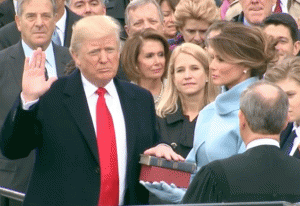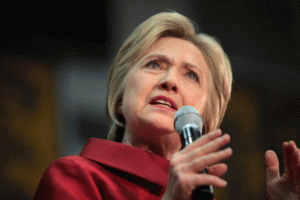From Consortium News

President Donald Trump being sworn in on Jan. 20, 2017.
(Image by (Screen shot from Whitehouse.gov)) Details DMCA
One year ago, the American electorate delivered a confused but shocking result, the election of Donald Trump over Hillary Clinton, a quirky outcome in the Electoral College that put Trump in the White House even though Clinton got three million more votes nationally. But neither party appears to have absorbed the right lessons from that surprise ending.
The Democrats might have taken away from their defeat the warning that they had forgotten how to speak to the white working class, which had suffered from job losses via "free trade" and felt willfully neglected as Democrats looked toward the "browning of America."
The choice of Clinton had compounded this problem because she came across as elitist and uncaring toward this still important voting bloc with her memorable description of half of Trump's voters as "deplorables," an insult that stung many lower-income whites and helped deliver Pennsylvania, Michigan and Wisconsin to Trump.
For more than a decade, some Democratic strategists had promoted the notion that "demography is destiny," i.e., that the relative growth of Latino, Asian and African-American populations in comparison to whites would ensure a future Democratic majority. That prediction seemed to have been validated by Barack Obama's winning coalition in 2008 and 2012, but it also had the predictable effect of alienating many whites who felt disrespected and resentful.
So, while the Democrats and Clinton looked to a multicultural future, Trump used his experience in reality TV to communicate with this overlooked demographic group. Trump sold himself as a populist and treated the white working class with respect. He spoke to their fears about economic decline and gave voice to their grievances. He vowed to put "America First" and pull back from foreign military adventures that often used working-class kids as cannon fodder.
But much of Trump's message, like the real-estate mogul himself, was phony. He really didn't have policies that would address the needs of working-class Americans. Still, his promises of a massive infrastructure plan, good health-care for all, and rejection of unfair trade deals rang the right bells with enough voters to flip some traditionally Democratic blue-collar states to Republican red.
Staying Blind
You might have thought that the Democrats would respond to Trump's shocking victory, which also left Republicans in charge of Congress and most statehouses around the country, by launching an apologetic listening tour to reconnect with working-class whites.

Former Secretary of State Hillary Clinton speaking with supporters at a campaign rally in Phoenix, Arizona, March 21, 2016.
(Image by (Photo by Gage Skidmore)) Details DMCA
There also might have been a clear-eyed evaluation of the weaknesses of the Democratic presidential nominee who came to personify the corrupt insider-culture of Official Washington, exploiting government service for financial gain by raking in millions of dollars for speeches to Wall Street and other special interests.
Clinton also offended many peace voters because of her support for aggressive war, both as a U.S. senator backing the disastrous invasion of Iraq and as Secretary of State pushing for U.S. military interventions in Libya and Syria. Her apology for voting for the Iraq War came across as opportunistic and insincere, and her undisguised delight over Libyan leader Muammar Gaddafi's grisly murder ("We came; we saw; he died!") seemed ghoulish.
And, whether fairly or not, many Americans were turned off by the Democratic Party's emphasis on "identity politics," the assumption that people would vote based on their gender, race or sexual orientation, rather than on bread-and-butter policies and war-or-peace issues.
In other words, the Democratic Party could have looked in the mirror and seen what many Americans found unappealing about the modern version of a party that had done so much to build the country, from the New Deal during the Great Depression through the Civil Rights Movement of the 1960s, and taking a leading role in addressing environmental, health-care and other national challenges.
But today's Democrats instead chose to blame their plight largely on Russia and its alleged "meddling" in U.S. politics, a strategy that not only made little sense -- given the many other reasons why voters turned away from Clinton and her party -- but delivered a message to white working-class voters who had gone over to Trump that they were "stupid" and had been "duped."
(Note: You can view every article as one long page if you sign up as an Advocate Member, or higher).





